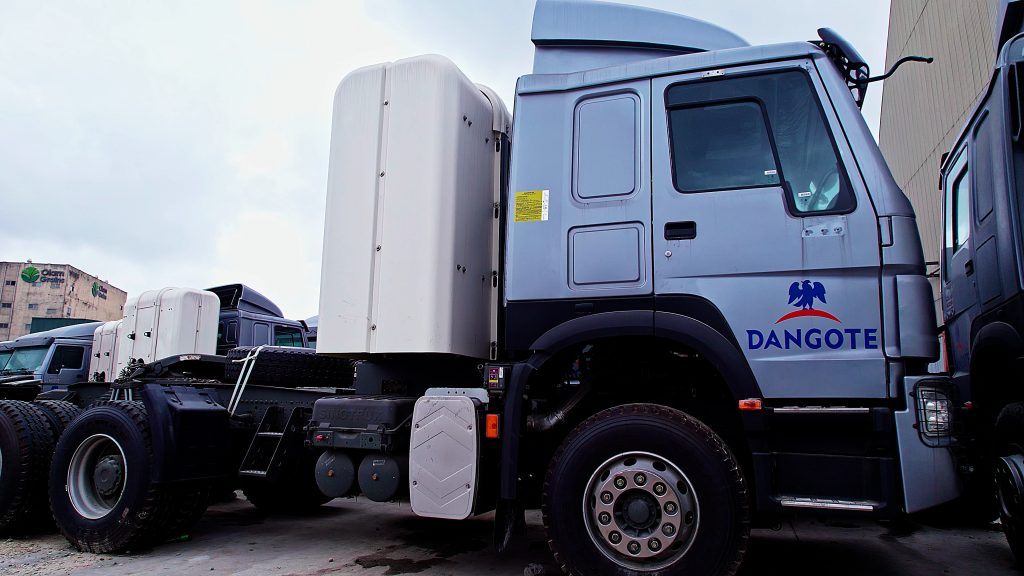OIL AND GAS
Dangote backs Tinubu’s CNG drive, invests over $280m in trucks, infrastructure
Dangote backs Tinubu’s CNG drive, invests over $280m in trucks, infrastructure
… becomes the largest operator of CNG trucks in Nigeria
AJAGBE ADEYEMI TESLIM
SPONSORED BY: H&H
In a demonstration of its support for President Bola Ahmed Tinubu’s CNG Initiative, which aims to provide cheaper and cleaner fuelling alternatives for all Nigerians, Dangote Cement Plc has made significant investments exceeding $280 million in compressed natural gas (CNG) technology and infrastructure.

President Tinubu, whose commitment to CNG deployment and clean energy is unmatched in Africa, has maintained his administration’s drive to create a conducive environment for private sector investments and expand Nigeria’s CNG infrastructure to enhance energy efficiency and drive economic growth. As part of this initiative, he ordered the distribution of 1 million free CNG conversion kits for commercial vehicles involved in transporting people, food, and goods.
At a recent event, the President emphasised the urgent need for Nigeria to utilise its vast natural gas resources in the transportation sector. He stated that CNG transportation is an economic necessity for Nigeria, signalling a significant shift in the country’s approach to public transportation and energy use.
“Utilising natural gas to power Nigeria’s transportation industry is the next way to go,” he stated.
On its part, the Dangote Cement said the over $280m investment not only solidifies its leadership in the CNG sector but also reflects its dedication to mitigating climate change and supporting a transition to a low-carbon economy.
Arvind Pathak, the Group Managing Director of Dangote Cement Plc, said the investment aims to acquire 100% CNG trucks as part of a long-term plan to transition its entire fleet to CNG.
This move marks a significant milestone in Dangote’s clean energy transition, with the objective of operating most of its fleet on CNG by mid-2026. As at October, the company has received its first batch of 1,500 mono-fuel CNG trucks while expecting additional 1,600 CNG trucks; totalling 3,100 before the end of the year.

Pathak stated, “By mid- 2026, Dangote Cement aims to operate a fleet predominantly powered by CNG. To facilitate this transformation, we are investing in expanding our CNG fuelling infrastructure, ensuring that our growing fleet has reliable access to CNG as our fuel.” He said plans are afoot to aggressively pursue this timeline of deployment, beginning from the first quarter of 2025. “We are keeping our eyes on the ball to ensure that we do not miss our target dates of full compliance”, he added.
Pathak said that the company’s CNG infrastructure investments have positively influenced Nigeria’s transition to cleaner fuels. He added that the CNG station at Obajana, capable of refuelling over 3,000 trucks, exemplifies this commitment, with a second station currently under development in Ibese to further support fleet operations.
President/Chief Executive, Dangote Group, Aliko Dangote said the company’s investments in CNG are also in line with Nigeria’s Nationally Determined Contribution (NDC) under the Paris Agreement, which aims for net-zero emissions by 2060.
“In this pursuit of transition to clean energy, we are optimistic of a remarkable accomplishment by President Bola Ahmed Tinubu, as he has taken the lead in the nation’s drive towards energy efficiency. This presupposes private sector intervention to support this noble idea initiated by the President,” Dangote added.
He noted that the company’s early adoption of CNG has made it the largest operator of CNG trucks in Nigeria, emphasising that the initiative is a boost to President Tinubu’s quest towards enhancing the nation’s energy independence and contributing to a more secure energy future.

According to him: “We are now using CNG vehicles, especially with the new policy of the Federal Government, launched under the Renewed Hope Agenda by His Excellency, President Bola Ahmed Tinubu. We are committed to a cleaner and greener future.”
